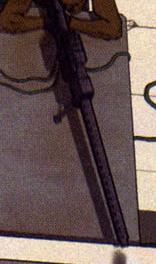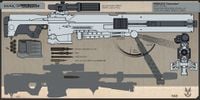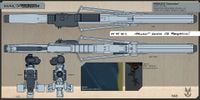M99 Stanchion: Difference between revisions
From Halopedia, the Halo wiki
m (Text replacement - "{{[Ee]ra\|[^}\n]*(Forerunner|Covenant|Human|UNSC|HCW|Post)[^}\n]*}}" to "{{Status|Canon}}") |
m (Replacing Specifications with Design details, due to the section discussing general design features + general fixes) |
||
| Line 22: | Line 22: | ||
| affiliation=[[UNSC Marine Corps]] | | affiliation=[[UNSC Marine Corps]] | ||
}} | }} | ||
The '''M99 Special Application Scoped Rifle''', also referred to as the '''M99 Stanchion Gauss rifle''' or simply the '''Stanchion''', is a [[United Nations Space Command]] anti-matériel rifle. <ref name="HEN310">'''[[Halo Encyclopedia (2009 edition)]]''', ''page 310'' </ref><ref name="HGN122" >'''Halo Graphic Novel''', ''Page 122''</ref><ref name="CH">'''Halo: Contact Harvest''', ''page 16''</ref> | The '''M99 Special Application Scoped Rifle''', also referred to as the '''M99 Stanchion Gauss rifle''' or simply the '''Stanchion''', is a [[United Nations Space Command]] anti-matériel rifle.<ref name="HEN310">'''[[Halo Encyclopedia (2009 edition)]]''', ''page 310''</ref><ref name="HGN122" >'''Halo Graphic Novel''', ''Page 122''</ref><ref name="CH">'''Halo: Contact Harvest''', ''page 16''</ref> | ||
==Design and development== | ==Design and development== | ||
| Line 31: | Line 31: | ||
===Ammunition=== | ===Ammunition=== | ||
The 5.4mm/.21 caliber round is very small in comparison to most standard firearms of the era, but using the Gauss technology, the small rounds have the ability to rip targets apart, even through office buildings.{{Ref/Reuse|CHP}} This is due to the high force imparted on the round via the Gauss acceleration method. The round creates shockwaves as it passes through the target and ripping through anything not as strong as a foot ( | The 5.4mm/.21 caliber round is very small in comparison to most standard firearms of the era, but using the Gauss technology, the small rounds have the ability to rip targets apart, even through office buildings.{{Ref/Reuse|CHP}} This is due to the high force imparted on the round via the Gauss acceleration method. The round creates shockwaves as it passes through the target and ripping through anything not as strong as a foot (30 cm) of titanium. {{Ref/Reuse|HEN310}} In the case of material targets, this is a minor explosion and the creation of structural fractures. In the case of personnel targets, it simultaneously rips apart and pulverizes the body around the impact area. Even hits in an extremity or near-misses can be deadly. | ||
The rounds have been known to have the ability to travel great distances without affecting the trajectory, delivering enough force to punch through [[instacrete]] pylons, blow a [[human]] apart, and continue on course through an abandoned parking lot. | The rounds have been known to have the ability to travel great distances without affecting the trajectory, delivering enough force to punch through [[instacrete]] pylons, blow a [[human]] apart, and continue on course through an abandoned parking lot. | ||
Revision as of 07:43, June 12, 2022
| M99 Special Application Scoped Rifle | |
|---|---|

| |
| Production overview | |
|
Type: |
Magnetic anti-matériel rifle |
| Specifications | |
|
Length: |
(o/a): 67 inches (170 cm) |
|
Weight: |
20.0 kilograms (44 lb) |
|
Ammunition type: |
5.4mm/.21 caliber |
|
Feed system: |
10 rounds |
|
Semi-automatic | |
|
15,000 meters/second (9.3 miles/second) | |
|
Effective range: |
7.5 kilometres (4.7 mi)[1] |
| Service history | |
|
In service: |
Insurrection
|
The M99 Special Application Scoped Rifle, also referred to as the M99 Stanchion Gauss rifle or simply the Stanchion, is a United Nations Space Command anti-matériel rifle.[1][2][3]
Design and development
Design details
The M99 works on the same operational principles as other magnetic weapons such as mass drivers and Magnetic Accelerator Cannons, albeit on a much smaller scale. This system works through using a series of electromagnetic coils (an asynchronous linear induction motor) rather than chemical propellants as a source of kinetic energy. The M99's weight and bulk limit the weapon's use to highly specialized long-range precision sniping roles.[4] It is typically used in extreme-range sniping and anti-materiel roles, but the recoilless nature of the weapon makes it ideal for fighting in microgravity as it does not send the wielder into an uncontrollable spin, such as during boarding actions and EVA.[5]
The M99 can be used with a portable computer to provide the ballistic calculations necessary to engage long range targets. The rifle can also be integrated with other systems, such as ARGUS drones for trajectory and ballistic data. The M99 also uses the ATLAS+ system developed by Ohana Prescient Systems.[2]
Ammunition
The 5.4mm/.21 caliber round is very small in comparison to most standard firearms of the era, but using the Gauss technology, the small rounds have the ability to rip targets apart, even through office buildings.[6] This is due to the high force imparted on the round via the Gauss acceleration method. The round creates shockwaves as it passes through the target and ripping through anything not as strong as a foot (30 cm) of titanium. [1] In the case of material targets, this is a minor explosion and the creation of structural fractures. In the case of personnel targets, it simultaneously rips apart and pulverizes the body around the impact area. Even hits in an extremity or near-misses can be deadly.
The rounds have been known to have the ability to travel great distances without affecting the trajectory, delivering enough force to punch through instacrete pylons, blow a human apart, and continue on course through an abandoned parking lot.
Development and service history
The M99 Special Application Scoped Rifle entered production in 2491.[2] Production was ceased in 2521.[2] Though it was used mainly for anti-matériel operations, the .21 caliber round (with a muzzle velocity of 15,000 meters per second) proved very effective against "soft" targets such as personnel.[6]
In March 2502, then-Corporal Avery Johnson used an M99 Stanchion to assassinate Jerald Ander, the leader of the Secessionist Union cell on Harvest. Johnson took the shot as the terrorist leader was driven by in an open-topped truck; Ander's head and upper torso were severed by the impact.[2] In 2524 during Operation: TREBUCHET, Johnson used a Stanchion mounted on a shock-absorbing armature while flying in an AV-14 Hornet, to kill an Insurrectionist terrorist driving a bomb-rigged truck; his first target was torn apart by the impact force. However, Johnson's second target detonated a bomb inside a Jim Dandy restaurant, killing herself, three Special Warfare Marines, and 38 civilians.[3][7] Early on during the Human-Covenant War in March 2526 Blue Team, Gold Team, and Green Team utilized M99 Stanchions during an attempt to capture the Covenant frigate Radiant Arrow.[5]
Shortly after the Subjugation of Earth Spartan-IV Kojo Agu used an M99 Stanchion given to him by the United Rebel Front while on Cassidy III to destroy the data pad that the Created Smart AI Leonidas was stored in. Production of the rifle had since ceased and Agu considered the weapon to be "old-school." [8] Snipers assigned to the UNSC Spirit of Fire continued to use the Stanchion as late as April 2559, as the ship had been lost in space for the past 28 years.[9]
Variants
- M99A2S3 Stanchion: The M99A2S3 is a variant of the M99 created by Isabel.[10] It has an inertia buffer that helps manage recoil.[11]
Trivia
- The M99 shares its designation with the real-life Barrett Model 99 single shot sniper rifle, a derivative of the Barrett M107A1 anti-materiél rifle.
- In some sources the M99 is referred to as "recoilless" but it is not clear whether it is technically a "recoilless" weapon or if this is a mistaken designation. If it is "recoilless" the manner by which it counteracts recoil is not known, as modern day "recoilless rifles" either eject propellant gas or a "countershot" of material with equal mass as the projectile, but no source has ever mentioned either of these recoil countering mechanisms on the M99. If the M99 is "recoilless" it may be that it has some as-of-yet theoretical way to reduce recoil, perhaps involving magnetic fields.
Gallery
List of appearances
- Halo Graphic Novel
- Page 122 (First appearance)
- Halo: Contact Harvest
- Halo Wars 2
- Halo: Bad Blood
- Halo: Silent Storm
Sources
- ^ a b c Halo Encyclopedia (2009 edition), page 310
- ^ a b c d e Halo Graphic Novel, Page 122
- ^ a b Halo: Contact Harvest, page 16
- ^ Halo Waypoint: Railgun
- ^ a b Halo: Silent Storm, Chapter 2
- ^ a b Halo: Contact Harvest, Prologue
- ^ Halo: Contact Harvest, page 86
- ^ Halo: Bad Blood
- ^ Halo Wars 2
- ^ Twitter - Jeremy Cook M99A2S3 breakdown
- ^ Twitter - Jeremy Cook on the inertia buffer
| ||||||||||||||||||||||||||||||||||||||||||||||||||


